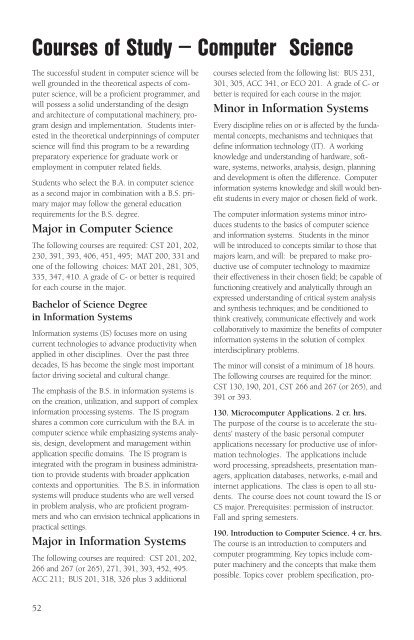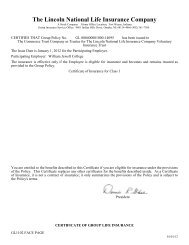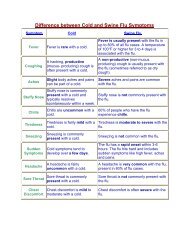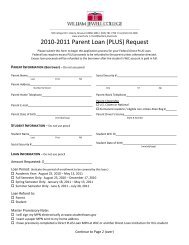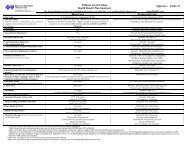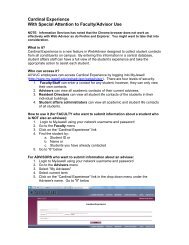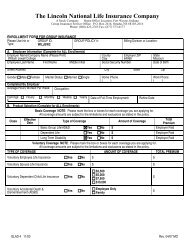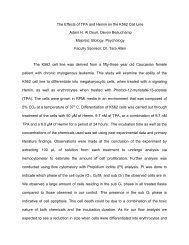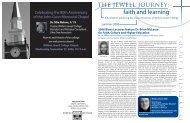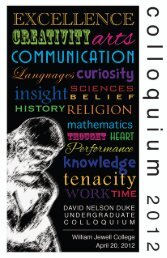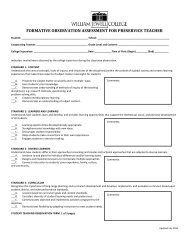Courses of Study - William Jewell College
Courses of Study - William Jewell College
Courses of Study - William Jewell College
Create successful ePaper yourself
Turn your PDF publications into a flip-book with our unique Google optimized e-Paper software.
<strong>Courses</strong> <strong>of</strong> <strong>Study</strong> – Computer Science<br />
The successful student in computer science will be<br />
well grounded in the theoretical aspects <strong>of</strong> computer<br />
science, will be a pr<strong>of</strong>icient programmer, and<br />
will possess a solid understanding <strong>of</strong> the design<br />
and architecture <strong>of</strong> computational machinery, program<br />
design and implementation. Students interested<br />
in the theoretical underpinnings <strong>of</strong> computer<br />
science will find this program to be a rewarding<br />
preparatory experience for graduate work or<br />
employment in computer related fields.<br />
Students who select the B.A. in computer science<br />
as a second major in combination with a B.S. primary<br />
major may follow the general education<br />
requirements for the B.S. degree.<br />
Major in Computer Science<br />
The following courses are required: CST 201, 202,<br />
230, 391, 393, 406, 451, 495; MAT 200, 331 and<br />
one <strong>of</strong> the following choices: MAT 201, 281, 305,<br />
335, 347, 410. A grade <strong>of</strong> C- or better is required<br />
for each course in the major.<br />
Bachelor <strong>of</strong> Science Degree<br />
in Information Systems<br />
Information systems (IS) focuses more on using<br />
current technologies to advance productivity when<br />
applied in other disciplines. Over the past three<br />
decades, IS has become the single most important<br />
factor driving societal and cultural change.<br />
The emphasis <strong>of</strong> the B.S. in information systems is<br />
on the creation, utilization, and support <strong>of</strong> complex<br />
information processing systems. The IS program<br />
shares a common core curriculum with the B.A. in<br />
computer science while emphasizing systems analysis,<br />
design, development and management within<br />
application specific domains. The IS program is<br />
integrated with the program in business administration<br />
to provide students with broader application<br />
contexts and opportunities. The B.S. in information<br />
systems will produce students who are well versed<br />
in problem analysis, who are pr<strong>of</strong>icient programmers<br />
and who can envision technical applications in<br />
practical settings.<br />
Major in Information Systems<br />
The following courses are required: CST 201, 202,<br />
266 and 267 (or 265), 271, 391, 393, 452, 495.<br />
ACC 211; BUS 201, 318, 326 plus 3 additional<br />
courses selected from the following list: BUS 231,<br />
301, 305, ACC 341, or ECO 201. A grade <strong>of</strong> C- or<br />
better is required for each course in the major.<br />
Minor in Information Systems<br />
Every discipline relies on or is affected by the fundamental<br />
concepts, mechanisms and techniques that<br />
define information technology (IT). A working<br />
knowledge and understanding <strong>of</strong> hardware, s<strong>of</strong>tware,<br />
systems, networks, analysis, design, planning<br />
and development is <strong>of</strong>ten the difference. Computer<br />
information systems knowledge and skill would benefit<br />
students in every major or chosen field <strong>of</strong> work.<br />
The computer information systems minor introduces<br />
students to the basics <strong>of</strong> computer science<br />
and information systems. Students in the minor<br />
will be introduced to concepts similar to those that<br />
majors learn, and will: be prepared to make productive<br />
use <strong>of</strong> computer technology to maximize<br />
their effectiveness in their chosen field; be capable <strong>of</strong><br />
functioning creatively and analytically through an<br />
expressed understanding <strong>of</strong> critical system analysis<br />
and synthesis techniques; and be conditioned to<br />
think creatively, communicate effectively and work<br />
collaboratively to maximize the benefits <strong>of</strong> computer<br />
information systems in the solution <strong>of</strong> complex<br />
interdisciplinary problems.<br />
The minor will consist <strong>of</strong> a minimum <strong>of</strong> 18 hours.<br />
The following courses are required for the minor:<br />
CST 130, 190, 201, CST 266 and 267 (or 265), and<br />
391 or 393.<br />
130. Microcomputer Applications. 2 cr. hrs.<br />
The purpose <strong>of</strong> the course is to accelerate the students’<br />
mastery <strong>of</strong> the basic personal computer<br />
applications necessary for productive use <strong>of</strong> information<br />
technologies. The applications include<br />
word processing, spreadsheets, presentation managers,<br />
application databases, networks, e-mail and<br />
internet applications. The class is open to all students.<br />
The course does not count toward the IS or<br />
CS major. Prerequisites: permission <strong>of</strong> instructor.<br />
Fall and spring semesters.<br />
190. Introduction to Computer Science. 4 cr. hrs.<br />
The course is an introduction to computers and<br />
computer programming. Key topics include computer<br />
machinery and the concepts that make them<br />
possible. Topics cover problem specification, pro-<br />
52


